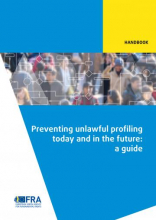
Austria
Technological developments have triggered an increased use of profiling in a wide range of contexts, including marketing, employment, health, finance, law enforcement, border control and security. The use of profiling tools to support the work of law enforcement and border management officials has received greater attention from EU Member States in recent years. Profiling is commonly, and legitimately, used by law enforcement officers and border guards to prevent, investigate and prosecute criminal offences, as well as to prevent and detect irregular immigration. However, unlawful profiling can undermine trust in the authorities, in particular in the police, and stigmatise certain communities. This in turn can escalate tensions between communities and law enforcement authorities for what is perceived as the discriminatory use of profiling.
This guide explains what profiling is, the legal frameworks that regulate it, and why conducting profiling lawfully is not only necessary to comply with fundamental rights, but also crucial for effective policing and border management. The guide also provides practical guidance on how to avoid unlawful profiling in police and border management operations. The principles and practices in the guide are supported by examples, case studies and case law from across the EU and beyond.